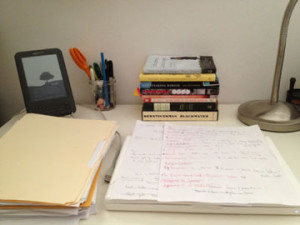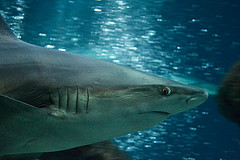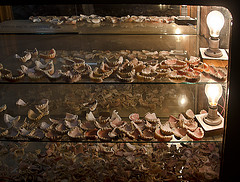“Frank and the Shark”
The best humor often comes from horrifying ironies. In Lauren Foss Goodman’s “Frank and the Shark,” Frank is not just an old man who doesn’t understand cell phones, as that would be too easy. Instead, she intertwines Frank’s fate with the shark – two solitary creatures on display, stranded, left to their own devices, and just barely hanging on to their remaining connections.
[SM]
“Sandbar Shark”
Albuquerque Biopark, used under CC BY-NC-SA 2.0
“This Precarious Hive: Denture House at MOMA”
“Teeth are practically the gateway to the soul,” says Natalie Carson, one of the two thieves who stole dentures for the sake of their artwork. Much of what makes “This Precarious Hive: Denture House at MOMA” such a fantastically disturbing story is Shena McAuliffe’s ability to connect the living and the dead through something as familiar and abject as our own teeth.
[SM]
“Denture Shop Window”
Eric Parker, used under CC BY-NC-SA 2.0
Poetry Daily appearance
Michelle Boisseau’s poem “Cataract,” which appeared in the Spring 2014 issue, was featured in July. We appreciate PD’s support!
Come As You Are Party: Jensen Beach
 One of the hardest but also the most rewarding things about having a book out [For out of the Heart Proceed] has been getting asked to talk about it. I don’t mean that to sound coy or falsely modest. I think it’s hard to talk about my writing, but it’s also rewarding, because having to do so sends me back into a story or into my memory of writing that story; invariably I learn something new. Likewise, I think it’s difficult to find the right way to talk about other books and about other writers, which is something that’s absolutely central to being able to discuss, say, how I might place short-short fiction in relation to prose poetry on some kind of map of literary genre. This is also really rewarding because it sends me back to books I love, where I get to relearn all over again just why that is. Sometimes these conversations happen in interviews, or in posts like this one, and sometimes it’s just through talking with a friend or a colleague who’s read the book. I’m asked about my influences or about what I was up to in particular stories, and so on. These are good questions, and it’s my job to try to come up with answers that make me seem, well, not dumb. For a guy whose first instinct is almost always to answer “I don’t know” that’s no small task.
One of the hardest but also the most rewarding things about having a book out [For out of the Heart Proceed] has been getting asked to talk about it. I don’t mean that to sound coy or falsely modest. I think it’s hard to talk about my writing, but it’s also rewarding, because having to do so sends me back into a story or into my memory of writing that story; invariably I learn something new. Likewise, I think it’s difficult to find the right way to talk about other books and about other writers, which is something that’s absolutely central to being able to discuss, say, how I might place short-short fiction in relation to prose poetry on some kind of map of literary genre. This is also really rewarding because it sends me back to books I love, where I get to relearn all over again just why that is. Sometimes these conversations happen in interviews, or in posts like this one, and sometimes it’s just through talking with a friend or a colleague who’s read the book. I’m asked about my influences or about what I was up to in particular stories, and so on. These are good questions, and it’s my job to try to come up with answers that make me seem, well, not dumb. For a guy whose first instinct is almost always to answer “I don’t know” that’s no small task.
Here’s an example: the title of my book is taken from a verse in the Book of Matthew that, as I read it, is about how we demonstrate who we are by our actions. Alan Heathcock puts it better in his book Volt, which is there in the stack on my desk. “We are what we do,” a character tells his son in the story “Smoke.” I like this idea and I like this sentiment. I think it’s true. Anyway, in an interview recently, I was asked to talk about this in relation to some of the characters in my book, about how thematically the title represents something cohesive about the collection as a whole. And that’s no easy question. Because of course part of the answer really is I don’t know. Or at least I didn’t know when I was writing the stories. So I had to go figure it out. To answer a question in an interview like this is an act of reflection, of revising intent, of analysis.
Reading now for special issue!
Editors Stacey Lynn Brown and Valerie Vogrin are thrilled to announce a call for submissions for the spring 2013 special issue: A Celebration of Women Writers. We are seeking poetry, fiction, and nonfiction by female and female-identified writers in all stages of their careers. Valerie is particularly interested in innovative prose forms, work that examines the lives of women, and graphic narratives. And Stacey is, as always, looking for poems that would take off the top of Emily Dickinson’s head. We look forward to reading your work! Click here for more information.
Rave Review!
The lovely people at New Pages reviewed last fall’s issue earlier this year. In addition to highlighting the work of Sean Singer, Erika Meitner, Leyna Krow, Doug Watson, Makalini Bandele, and Marc McKee , they concluded with these heart-warming words, “In sum, Sou’wester is a bright, energetic publication that can be read in pajamas or pantsuits—that is, on many different levels that all seem to work well and function cohesively. The writers in this journal are uniformly excellent and marry diverse styles and content in a triumphant read.” Of course, you’ll want to read the entire review.
More Than Just Another “Kahlua & Breast Milk Story”
 Recently, assistant editor David Rawson posed a number of questions to Benjamin Reed about his story, “Surprise Me With Something Familiar” (Spring 2007). Benjamin responded with generosity, insight, and hilarity – way more than we could have hoped for.
Recently, assistant editor David Rawson posed a number of questions to Benjamin Reed about his story, “Surprise Me With Something Familiar” (Spring 2007). Benjamin responded with generosity, insight, and hilarity – way more than we could have hoped for.
How does this story fit into the rest of your work?
I remember it was one of the first couple times I thought I’d written a “polished” piece. But back then I didn’t read a lot of literary journals and I had a really naive perspective of contemporary fiction. I think I judged all my manuscripts in terms of whether or not they might get accepted by Glimmer Train.
How did this story come to be?
I was a bartender for a long time, in a small, dark lounge on Red River, what used to be the very edge of downtown Austin. It was so dark, all the light was from a few dozen red venetian candles and the glowing ends of people’s cigarettes. We poured beers practically by feel, and mixed drinks by sound and texture. We hated making white Russians. Cream–really it’s half-and-half–froths when you shake it. It expands. It gets everywhere, all over your hands, the bar, the bar mats, your shirt, the upside-down glass you use to cap your shaker tin–everywhere. And after you make a white Russian you have to rinse everything extra, which clouds the blue water of the sanitatizing sink. And usually the people ordering them were amateurs, posers, or young men who over-identified with The Big Lebowski.
As such, the manager was constantly “forgetting” to buy half-and-half. So we were always being prompted to suggest a replacement. Usually this would be Bailey’s. One night, we started joking about making white Russians with breast milk. One of our bartenders had just come back to work after having a baby, and was always talking about lactating and pumping. I asked her if she would be up for a donation. Just a few ounces. She said she’d think about it. When I asked again later she replied with a decisive “No.” I assume she’d mentioned it to her husband, and he clearly did not think it was as amusing an idea as I did.





